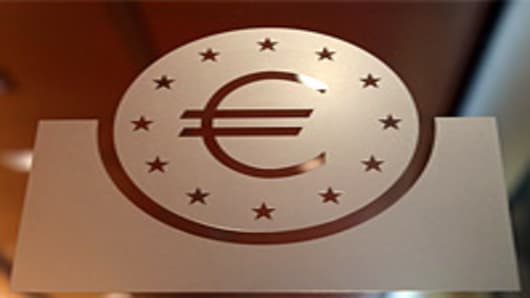You know me. I am like a Joan of Arc of the European Central Bank. For the better part of its existence I have reported about and vigorously defended its mandate and most of the time its policies and strategy. Even at times when it was facing a barrage of criticism from infuriated or frustrated markets. So nobody, nobody ever accuse me of being an ECB-, let alone euroskeptic.
This time, however, "Joan of Arc" has dismounted her horse and laid down her sword. This time I cannot defend ECB policy. Funny, because this time around, the ECB and most notably its president Mario Draghi have harvested resounding praise from the financial community all around. For a change.
Last week´s decision for "outright market transactions" or OMTs— in plain English, an ECB bond buying program Mark II — were greeted with triumphant fanfares of "at last!" and "Finally the ECB is doing its job!" Is it really?
Let´s just consult the ECB mandate. Under the heading "Independence" you find the following sentence: "Neither the ECB nor the national central banks (NCBs), nor any member of their decision-making bodies, are allowed to seek or take instructions from EU institutions or bodies, from any government of an EU Member State or from any other body".
"So what?" you say? With its OMT program the ECB is neither seeking nor giving instructions. Ahhh, not so fast. With its OMTs the ECB is setting politicial pre-conditions(the often-used buzz word "conditionality") for executing monetary policy in order to safeguard price stability and the functioning of monetary transmission processes as laid down in its mandate. In other words, the ECB is saying, we will only do our job if certain political conditions are met.
It's really that simple: either bond purchases of euro countries where yields are blowing up in a fashion that threaten the functioning of the markets are within the ECB mandate. Then the ECB should embark upon them whenever it sees fit. Or they are not within the mandate; then it should jolly well stay away from them, because it would be illegal. Period. End of argument.
But to say "we are acting within our mandate"; but we shall only do so, if you (the country in question) deliver on certain political conditions; then — I am sorry — the ECB is taking on a role it was never designed for and that is certainly outside its mandate. The ECB was designed for supporting "the general economic policies in the Community with a view to contributing to the achievement of the objectives of the Community" (in as far as it doesn't´t infringe upon the primary mandate of safeguarding price stability). Supporting policy, not setting conditions for it or setting an agenda for which economic of financial policies a given country embarks upon.
Imagine the following scenario: Bond yields for both Spain and Italy go through the roof. Spain submits itself to some sort of bailout regime, Italy refuses to even think about it. Panic in the markets. Euro breakup speculation flares up. And what does the ECB do (if what Draghi announced last Thursday is cast in iron)? The ECB buys Spanish bonds and lets Italian bonds tank. Because Italy did not meet the ECB´s definition of "conditionality".
Do you really think that would be within the ECB's mandate? To reward or punish depending on political decisions in a member country?
I think the very thought is preposterous!
The ECB — like any other central bank — is a guardian and a facilitator. For price stability, currency stability and a smooth functioning of money (and bond) markets. It does not and should not presume to direct, decide or dictate political processes in the euro zone countries. That is up to politicians (and the electorate, when and if they are asked to cast their vote), however frustrating the outcome of the process might be!
Don't get me wrong: I fully understand the exasperation ofr our ECB policy makers. They have throughout this crisis always been left to clean up the mess of markets, bankers and politicians. But they can only do so if they stick to their role within this very flawed system. They cannot constantly redefine it.
And to make another point crystal clear: I happen to think that bond purchases are absolutely within the ECB´s mandate. The Bundesbank did it all the time — "for market-tending purposes", as was the phrase when it happened. But the ECB has to buy bonds when and if it finds that the markets are in danger of no longer functioning. Or when yields have reached irrational panic levels. In short, it has to do its job: safeguard a smooth functioning of monetary transmission processes. Irrespective of whether the issuer in question met certainly political conditions or not.
ECB bond buying Mark I was exactly that: The ECB bought what it thought was necessary to smoothe tidal waves in the markets. It wasn't particularly successful; but it was at least right in principle. Bond buying Mark II is a political "animal" in the way that the old bond buying program was not. And it could very well change the nature and the firepower of the ESM — for better or worse. It could also change the center of gravity for policymaking in the euro zone. Away from Berlin, Paris, Madrid, Rome or Brussels and to Frankfurt and the ECB. That cannot be how we build the future of Europe, no matter how capable and well meaning the stability guardians at the ECB.


